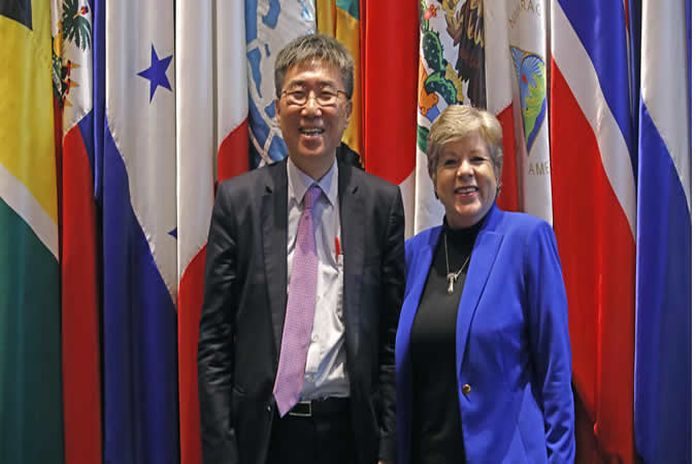SANTIAGO, Chile – The renowned economist and Professor at the University of Cambridge (United Kingdom) Ha-Joon Chang, delivered on August 21, the XVI Raúl Prebisch lecture at the Economic Commission for Latin America and the Caribbean (ECLAC), where he proposed creating a new international economic order and called on developing countries to fight attempts to weaken multilateralism.
“The developing countries need to fight against the attempt of the rich countries to undermine multilateralism. The international economic system needs to be reformed in a more pro-developmental way,” said the expert, who is a Reader at the Faculty of Economics and Director of the Centre of Development Studies at the University of Cambridge, and who is considered one of the world’s most influential heterodox economists in the field of development economics.
Professor Chang was received by Alicia Bárcena, ECLAC’s executive secretary, who welcomed him on behalf of this United Nations regional commission.
“The Prebisch lecture series is an especially important occasion for ECLAC, on which we take time to reassess our ideas and reflect on the new challenges posed by a rapidly changing international economy. But it is also an occasion to confirm our strong commitment to promoting equality, democracy and development on a sustainable basis,” the senior international official stated.
Bárcena added that to promote global development, Prebisch’s vision indicated that both the center and the periphery should adopt coordinated policies, consider the tensions and complementarities that arise from the co-evolution of their production structures, and open spaces for building capabilities in the periphery. “The importance of this policy space and the role of time in learning have been discussed in Dr Chang’s works,” she noted.
“Dr Chang is a close friend of our institution, not only because of the contents of his contributions, the importance he affords to history and politics in shaping ideas, policies and economic outcomes, or our theoretical affinities but above all because of his strong ethical commitment to fighting inequality and promoting sustainable development,” Bárcena stated.
“If we are to emerge from the harsh economic conditions that prevail today and move towards development with equality in the framework of the 2030 Agenda and the Sustainable Development Goals, we must pursue economic, industrial, social and environmental policies aligned with progressive structural change,” ECLAC’s executive secretary underscored.
In his keynote lecture, Dr Chang referred to the “New International Economic Order” (NIEO) promoted by Raúl Prebisch in the 1970s, and explained that a new version of this postulate is necessary; one that Chang calls the “New-New International Economic Order”, (NNIEO) based on the recognition that the international economic system should maximize policy space so that countries can adopt the measures most suited to them, according to their own capabilities and needs.
He indicated that there are factors working against progress towards this new order, but there are also other factors facilitating it. Among the first set is the dominance of neoliberal ideology in the last few decades, which, although it is weakening, has made developing countries more accepting of the current international economic order.
In contrast, there are various factors working in favour of NNIEO, primarily in three areas: changes in the world economy, changes in ideas, and contingent factors.
In the first area, there is the fact that developing countries now have more weight in the global economic system; interactions between them have become increasingly important and are reflected, for example, in South-South trade, which has greatly increased (from 42 percent in the mid-1990s to 57 percent in the mid-2010s); and the emergence of China, India and other developing economies as important international financial actors.
In the realm of changes in ideas, Chang highlighted that many things that were considered radical in the past are accepted now and have even been realized to an extent. For example, some countries have already over-fulfilled the 0.7 percent of GDP target for foreign aid, and there have been cancelations of developing country debts as well.
Among the contingent factors, the Cambridge scholar mentioned climate change, the urgency of which puts increasing pressure on rich countries to do more to help developing countries, especially through large-scale transfer of technology for climate mitigation and adaptation; and the China factor, in reference to a country that has become a major actor in the global economy while still being a developing country.
“There is a particular concern with the future of the world trading system, with the aggressive trade policy of the Trump administration in the United States. This has increased the concern that the current world trading order based on multilateralism that is, the WTO (or the World Trade Organization) system is under serious threat,” Chang warned.
“A truly developmental multilateral system needs to be based on the principle of asymmetric protectionism. In this system, economically weaker countries are allowed to protect and regulate more than the stronger countries can and are expected to reduce the use of these extra policy measures only gradually, as their economies develop over time and catch up with those of the richer countries,” Chang explained.





